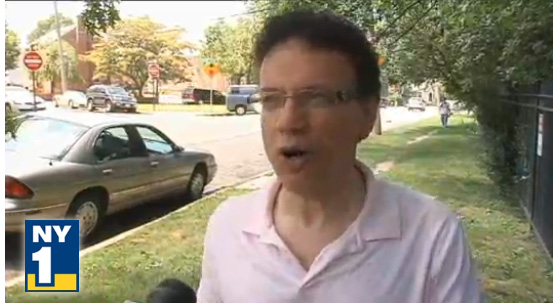
To borrow from the Wall Street Journal's Jason Gay, this NY1 segment starring City Council Transportation Chair James Vacca seems to come straight out of the "shrill and embarrassing" early 2011 phase of NYC bike coverage.
Once reporter Michael Herzenberg intones in his best investigative journalist voice that "believe it or not, many of the most controversial lanes were actually part of a city master plan developed under a different administration," we are well into bizarro land. An NYC where there's no public opinion data showing 56 percent of voters favor the expansion of the bike network, where one cyclist is presumed to speak for everyone who might ride a bike, and where a document from 1997 -- an era when no one ever considered building a protected bike lane on the streets -- is controlling the bike policies of today.
And there is the transportation chair, waving at a street and expressing his consternation that it may one day sport a bike lane. Or maybe just bike stencils. Who knows? Yes, it's on a Giuliani-era map of potential bike routes, but DOT hasn't actually proposed implementing a bike lane there.
Eventually, we get to the actual news, which is that Vacca has proposed a bill requiring the city to update the bike master plan every five years, starting in 2012. Innocent enough, right? But here's the bizarro part: Vacca's bill would compel DOT to estimate, "to the extent practicable," where every route in the plan would eliminate parking spaces or travel lanes. Safety first.
The fact is that every bike project already goes through the community board process before implementation. Vacca's bill would add an extraneous layer of bureaucracy to the long-term endeavor of building out a connected network for safe cycling.
Vacca spokesperson Bret Collazzi compared the bill to long-range exercises like the city's waterfront plan or the school construction authority's five-year plans. But the waterfront plan is an outline. So is the bike plan -- details like configuring the bikeway and determining what happens at the curb don't get hammered out in a long-range plan.
Collazzi also contended that presenting detailed projections upfront, even for projects that might not get built for decades, is "a more responsible way to do community planning." He cited the Prospect Park West redesign as an example of a project that would have benefited from Vacca's approach, since it appears in the master plan as a one-way, un-protected lane. But the PPW process was as community-based as you can get, the result of years of public workshops, meetings, and votes. It was, in fact, the community board that asked DOT to study the two-way protected bike lane that was eventually built.
As it happens, the point about PPW's place in the 1997 master plan was also raised by none other than former deputy mayor Norman Steisel, a fierce opponent of the PPW project, in an email to DOT Commissioner Janette Sadik-Khan, and copied to Vacca, last fall [PDF]. When Steisel forwarded his message to Marty Markowitz and Iris Weinshall, he said of Sadik-Khan, who worked under him in the Dinkins administration: "she once considered me a mentor, now her tormentor."
Transportation Alternatives responded to the Vacca bill in a statement:
What’s more valuable: a human life or a parking spot?
Bike lanes save lives. These street safety improvements are proven to reduce fatal crashes by 40 percent for everyone — bicyclists, pedestrians and drivers.
This bill co-opts the already-extensive and participatory community process in order to prioritize the convenience of motorists over everyone’s safety.
There's just no good reason to single out bike lanes for extra bureaucratic review. Community input in transportation planning is important, that's why we have Local Law 90, which requires the City to present and take community feedback on all of its bike lane projects.
Duplicating the existing mechanisms for community process and adding the requirement to highlight lost parking is a simply a way to obstruct and slow down life saving street safety improvements. This bill will drown out the voices of ordinary New Yorkers, who are clamoring for these safety improvements by a significant majority.
Collazzi denied that Vacca sought out the cameras, saying that NY1 found out about the bill from someone else. "They came to us," he said. "We're not looking to fan the flames of bike hysteria. We're not in a position where we're trying to get everyone hyped up about this." Yet, that is basically what happened, with Vacca starring in a segment that pushes a narrative about the city building "a controversial proliferation of bike lanes."
Vacca did not share the proposal with NYC DOT before introducing the legislation. Collazzi said Vacca expects to speak with DOT about the bill soon, and plans to hold another bike hearing sometime this year.
The torment continues, apparently.





